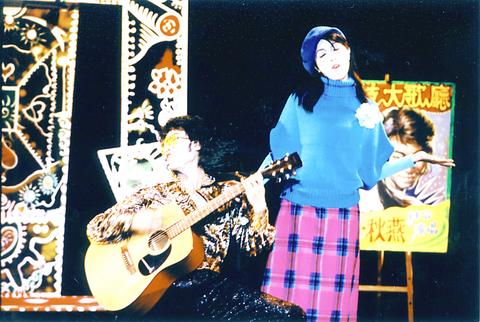S teppinginto a rehearsal for Golden Bough Theater's (
In the past decade since it was founded, Golden Bough Theater has made a name for itself by performing everywhere from formal theaters to small-town night markets throughout Taiwan. Their style is marked by a fusion of modern theater elements with traditional Taiwanese opera. She is So Lovely, the company's twelfth full-fledged production, is no different; a combination of popular Taiwanese songs from the 1930s to the 1970s, melodrama and spoofs of popular television shows and Hong Kong action movies for an hour and a half of comedic cabaret.

PHOTO COURTESY OF THE CKS CULTURAL CENTER
The story, by Yu Hui-fen (游惠芬), is set in a famous Taiwanese nightclub. Chien-li, a street vendor who falls in love with one of the nightclub's singers, begins a life of crime when his sweetheart falls for a rich patron and flies away to America. Two of the club's headline acts, Chi-chiang and Chou-yen, also fall in love, only to be torn apart by jealousy, then reunited. Others involved include a wealthy young lady who falls in love with Chi-chiang, the man who loves her and a band of "Black Hand" killers. Chien-li, for his part, begins killing indiscriminately, but sheds tears of remorse for each of his victims. If it all sounds confusing, it is. But the plot is not what the show is about.
"It's all lighthearted," Wang later said. "We want audiences to be entertained by the show, not be afraid of it."
Wang should know what's entertaining. He's the son of award-winning Taiwanese television actress Hsieh Yue-hsia (
Audiences may also recognize the set design and marquees by Lee Chun-yang (李俊陽), whose renditions of film posters have long adorned building sides in Hsimenting. Lee's design turns the entire house into something reminiscent of a high-school prom, with heart-shaped balloons hanging from the ceiling and huge red streamers running from candy-colored rococo set pieces, adding to the cabaret feel. Equally splendid, Chen Po-wei's (陳柏維) costume design is a study in kitsch with shirts that look like wallpaper and blouses with which you could cover windows.
Watching a rehearsal with actors dressed in street clothes, however, it's easy to see that it is the cast that makes the show enjoyable. Led by Wu Peng-feng (
"The show is really about the music," Wu says, adding that Chinese, Japanese and Western influences all have helped shape Taiwan's musical canon. "The music has great energy and is so diverse -- love songs, folk songs, rock songs -- it's what energizes the show and makes it appealing to a wide audience."
Before sliding back on stage, Wu introduces me to the company manager, Judy Tseng (
She is So Lovely is part of the Chiang Kai-shek Cultural Center's Formosa Experimental Theater Festival and plays tonight and tomorrow night at 7:30pm at the National Experimental Theater. Matinee shows are tomorrow and Sunday at 2:30pm. Tickets cost NT$450 and are available at all Acer ticketing outlets or at the venue. The National Experimental Theater is located at 21-1 Chungshan S. Rd., Taipei (

May 18 to May 24 Pastor Yang Hsu’s (楊煦) congregation was shocked upon seeing the land he chose to build his orphanage. It was surrounded by mountains on three sides, and the only way to access it was to cross a river by foot. The soil was poor due to runoff, and large rocks strewn across the plot prevented much from growing. In addition, there was no running water or electricity. But it was all Yang could afford. He and his Indigenous Atayal wife Lin Feng-ying (林鳳英) had already been caring for 24 orphans in their home, and they were in

On May 2, Chinese Nationalist Party (KMT) Chairman Eric Chu (朱立倫), at a meeting in support of Taipei city councilors at party headquarters, compared President William Lai (賴清德) to Hitler. Chu claimed that unlike any other democracy worldwide in history, no other leader was rooting out opposing parties like Lai and the Democratic Progressive Party (DPP). That his statements are wildly inaccurate was not the point. It was a rallying cry, not a history lesson. This was intentional to provoke the international diplomatic community into a response, which was promptly provided. Both the German and Israeli offices issued statements on Facebook

President William Lai (賴清德) yesterday delivered an address marking the first anniversary of his presidency. In the speech, Lai affirmed Taiwan’s global role in technology, trade and security. He announced economic and national security initiatives, and emphasized democratic values and cross-party cooperation. The following is the full text of his speech: Yesterday, outside of Beida Elementary School in New Taipei City’s Sanxia District (三峽), there was a major traffic accident that, sadly, claimed several lives and resulted in multiple injuries. The Executive Yuan immediately formed a task force, and last night I personally visited the victims in hospital. Central government agencies and the

Australia’s ABC last week published a piece on the recall campaign. The article emphasized the divisions in Taiwanese society and blamed the recall for worsening them. It quotes a supporter of the Taiwan People’s Party (TPP) as saying “I’m 43 years old, born and raised here, and I’ve never seen the country this divided in my entire life.” Apparently, as an adult, she slept through the post-election violence in 2000 and 2004 by the Chinese Nationalist Party (KMT), the veiled coup threats by the military when Chen Shui-bian (陳水扁) became president, the 2006 Red Shirt protests against him ginned up by